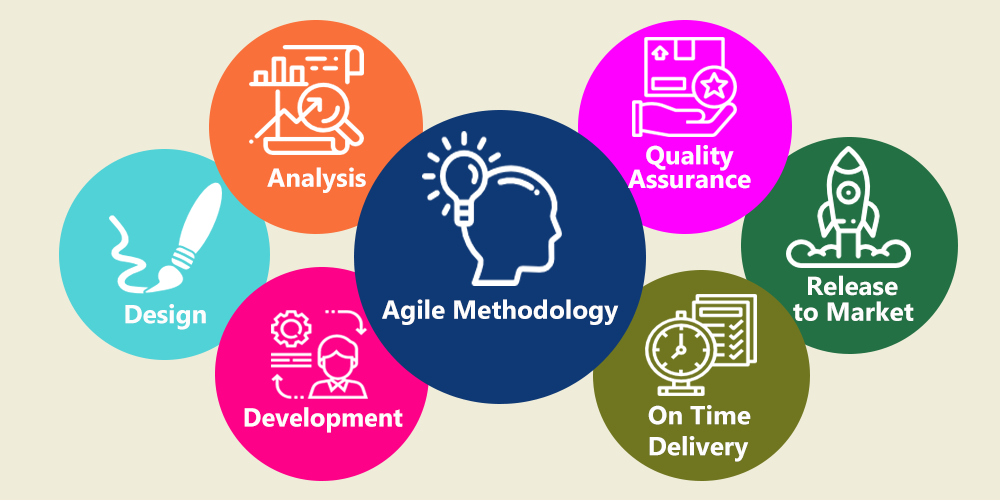
With the advancement of mobile technologies more and more mobile app development companies are coming out with mobile app solutions. Start-ups and enterprises these days are not only developing mobile apps for their end users but also use one for automating their business processes. This helps businesses to increase their productivity and staff satisfaction which will lead to a satisfied & delighted end consumer.
However, to make the most of the app markets, new apps must be developed fast with low time-to-market (TTM). The solution to low TTM lies in Agile Development Methodology. Before explaining Agile Methodology for mobile apps, let us briefly go through the mobile app development process.
The typical mobile app development process follows the following roadmap:
- Concept
- Prototype
- Design
- Develop
- Test
- Deliver
Now, in the non-agile development practices, each step is finished completely before moving to the next step and so on. Finally, in the Testing stage, many errors and bugs come up. This results in delayed delivery.
Mobile app development in itself is a lot of work and traditional software development methods make it even more tiresome. It is true that mobile app developers face many difficulties like reduced efficiency & delayed delivery while developing new mobile apps. In order to tackle those difficulties, mobile app developers need a project development strategy that is capable of delivering multi-platform solutions in a fast and cost-effective manner.
This is where Agile Methodology for mobile development steps-in. Agile Software Development can be rightly called most-effective and reliable approach to any product development. The prime factor responsible for its effectiveness is the continuous flow of communication between the clients and the product development team.
What exactly is the Agile Project Development Strategy?
The dictionary meaning of the word ‘Agile’ is the ability to move fast & easily adapt to changes. Similarly, the Agile process is a streamlined and flexible iterative approach that build mobile apps by dividing the tasks into short cycles called Sprints. In each sprint, a part of the mobile app is developed which is then reviewed. Any last minute changes are incorporated into the next sprint. During each sprint cycle, there is continuous communication among development team, Project Manager and the client.
The general skeleton of the agile software development is; planning – developing – testing & reviewing and this repeats until the final bug-free product is ready to be released. In Agile mobile App development, the testing team becomes an integral part of the development process from the beginning. All these results in high-quality development.

“It is not the strongest of the species that survive, nor the most intelligent, but the one most responsive to change.” – Charles Darwin
Product Backlog in Agile development methodology is essentially the list of features according to priority. Rather than containing lengthy document of requirements, the list contains the short & easy to understand descriptions of the desired functionalities of the working software.
Sprint Planning is a meeting where the team collectively picks the items from Product Backlog that must be completed in the upcoming sprint and also discusses their plan on completing those items. The items picked during Sprint Planning are called Sprint Backlog.
The core values (Source: Agilemanifesto.org) of the Agile Software Development Process focuses on:
- Individuals and interactions over processes and tools
- Working software over comprehensive documentation
- Customer collaboration over contract negotiation
- Responding to change over following a plan
12 Proven principles that form the basis of Agile Development Process. (Source: Agilemanifesto.org)
- Our highest priority is to satisfy the customer through the early and continuous delivery of valuable software
- Welcome changing requirements, even late in the development. Agile processes harness change for the customer’s competitive advantage.
- Deliver working software frequently, from a couple of weeks to a couple of months , with a preferance to the shorter timescale.
- Bussiness people and developers must work together daily throghout the project.
- Build projects around motivated indiviuals. Give them the environment and support they need, and trust them to get the job done.
- The most effecient and effective method of conveying information to and within the development team is the face-to-face conversation.
- Working software is the primary measure of progress.
- Agile processes promote sustainable development. The sponsors, developers and users should be able to maintain a constant pace indefinitely.
- Continuous attention to technical excellence and good design enhances agility..
- Simplicity- the art of maximizing the amount of work not done is essential.
- The best architectures, requirements and designs emerge from self-organising teams.
- At regular intervals, the team reflects on how to become more effective, then tunes and adjusts its behaviour according.
The IT market today is changing at a faster rate than expected. The Agile Mobile App Development allows project management teams at one of the leading custom software development companies to address the ever-evolving needs of today’s users and position the businesses to win the market with their software solutions.
Create a Mobile App that wins every time
Mobile app development can reap an array of benefits from the Agile Software Development Process. Bring your ideas to life and achieve digital transformation with our Mobile apps & Web apps that offer a great user experience to the internal staff, business associates and end-consumers. Contact us to know how we can transform your ideas into a high quality working software with Agile Methodology for mobile apps.
